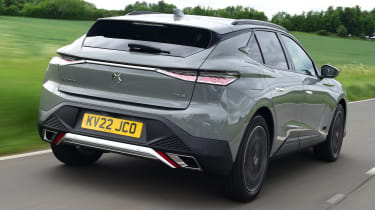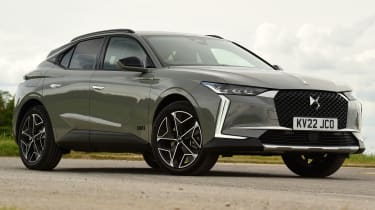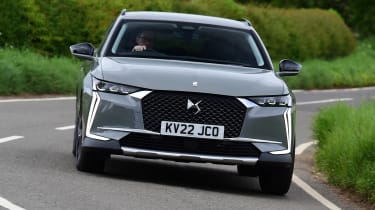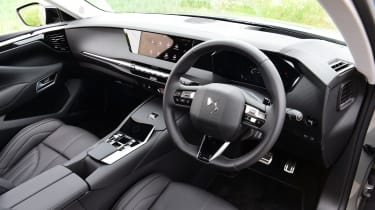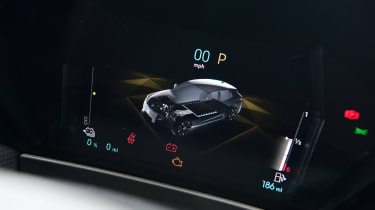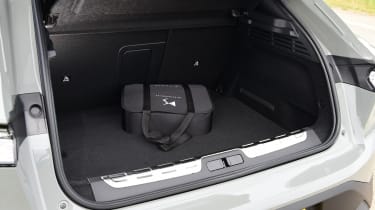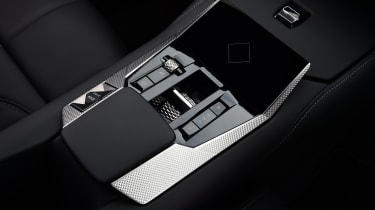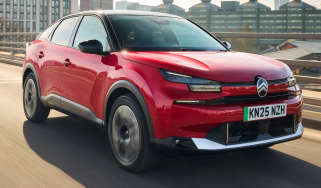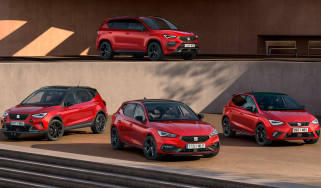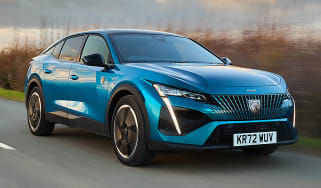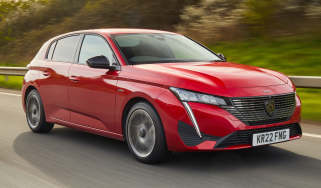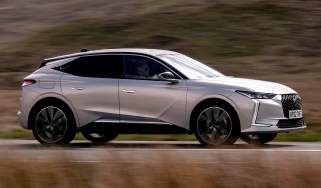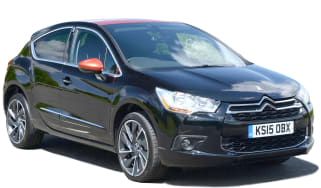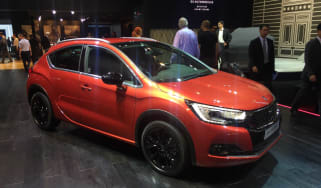DS 4 review – French model takes on premium rivals
“The DS 4 is an upmarket hatchback to rival the Mercedes A-Class and is the brand’s most convincing model yet"
Pros
- Smart styling
- Luxurious interior
- Impressive hybrid model
Cons
- Rear seat space a little tight
- AEB not standard
- Slow diesel model
Verdict - Is the DS 4 a good car?
The latest DS 4 is a posh hatchback that’s aimed squarely at the Mercedes A-Class, Audi A3 and BMW 1 Series, as well as the related Peugeot 308. As evidenced by the A-Class’ regular appearances in our top 10 best-selling cars list, the DS 4 is entering a competitive part of the market. It certainly has an appealing design, without compromising practicality too much. There’s also the choice of an efficient plug-in hybrid, but negatives include some weedy petrol and diesel engines and fairly punchy pricing.
DS 4 models, specs and alternatives
The previous DS 4 Crossback had a quirky design to help it stand out, in a move similar to Lexus’ bold styling. Its replacement takes a more refined approach, with high-quality materials and an interior offering a different take on luxury when compared with German rivals. DS is also keen to stress that customer service, both before and after you buy, will be top-notch too – another area Lexus has excelled in. That’s not always been the case and sharing dealerships with Citroen arguably diluted the DS brand.
 Top 10 best plug-in hybrids on sale today
Top 10 best plug-in hybrids on sale today
The DS 4 is an interesting car to look at even in entry-level form, with eye-catching daytime running lights and an intricate tail-light design. You can add Performance Line or Cross styling packs if you’d like more sportiness or ruggedness respectively. The Cross is a little jacked up and is trying to be a crossover like the BMW X2, Lexus UX and Cupra Formentor.
If its predecessor felt like a conventional car in more luxurious clothing, the current DS 4 looks and feels like a premium product from the off. There’s no real entry-level model to the range, with all being well-equipped and feeling upmarket, and the styling is striking too, with eye-catching daytime running lights, an intricate tail-light design and flush door handles that only pop out when you need them. Most models feature exterior details picked out in a chrome finish, though Performance Line versions are somewhat toned down.
More reviews
In-depth reviews
You get four trim levels across the DS 4 range. Performance Line is the de facto starting point with prices beginning at around £33,000. Another £2,000 jumps up to classy Rivoli trim, and from there the range forks off to two more models, the bright and airy Esprit de Voyage starting from £37,000, and the even higher specification Opera, which is priced nearer to £39,000 – though Opera trim with the E-Tense plug-in hybrid engine is around £47,000, which is rather steep for the class.
 Top 10 best plug-in hybrids on sale today
Top 10 best plug-in hybrids on sale today
The DS 4 is available with a range of powertrains that consist of petrol, diesel, mild-hybrid and plug-in hybrid options. However, DS is set to become an electric-only brand in the coming years, so it’s likely combustion engines will slowly be phased out in favour of electrified units.
In typical DS fashion, the interior looks fantastic. The tall dashboard sweeps uninterrupted over two crisp screens, while the chrome beltline makes the car feel wider and helps to hide the air vents. A third screen in front of the shrunken gear selector can be configured to control your most used functions. The materials used feel very upmarket and we like that it feels quite different to its German rivals. Practicality is decent too, with a bigger boot than the A-Class and Volkswagen Golf.
MPG, running costs & CO2
A range of familiar engines means the DS 4 shouldn’t be expensive to run. The cheapest engine, a 1.2-litre petrol, promises up to 48.6mpg. DS has phased out the more powerful 1.6-litre petrol, which could deliver around 43mpg, but the 1.5-litre diesel engine remains, badged BlueHDi 130 and capable of just over 61mpg combined. For 2024 a mild-hybrid version of the 1.2-litre petrol also arrived, with a small electric motor to give the combustion engine a helping hand for improved efficiency. This can save around 15% on fuel bills, while its CO2 emissions figure is cut to 116g/km.
A DS 4 E-Tense plug-in hybrid model is also available and will be the cheapest to run if you regularly plug it in. This has an electric range of up to 34 miles – slightly less than the 44 miles promised by the equivalent Mercedes A 250e – and it can be driven in e-mode at up to 83mph. Like all plug-in hybrids, it’s rather expensive to buy or lease and will make the most sense as a company car, due to its 24-30g/km CO2 output – meaning a far lower Benefit-in-Kind tax bracket than petrol and diesel models.
The E-Tense has an official fuel-efficiency figure of as much as 269.5mpg, but this is only really possible with regular charging and short trips, where the petrol engine rarely needs to fire up. During our testing that incorporated long-distance drives and short trips, we averaged 56.2mpg.
A three-year, 60,000-mile warranty is a pretty standard offering, although the Mercedes A-Class does get cover for unlimited mileage in three years. The E-Tense’s battery gets an eight-year or 100,000-mile warranty, which covers you if the battery drops below 70% charging capacity in that time.
Engines, drive & performance
DS Automobiles has slimmed the DS 4’s engine range down to just a trio of options, though buyers should be able to find something that suits their needs – with petrol, diesel, and plug-in hybrid options, only a full EV is notably missing. Conveniently for those with limited capacity for remembering power figures, both the petrol and diesel make the same 128bhp output, though the diesel has more pulling power, with 300Nm of torque to the petrol’s 230Nm. Things also get a bit more complex if you pick the mild-hybrid version of the petrol, with 134bhp. The extra punch of the electric motor also means it can get up to speed quicker, with a 10.4-second 0-62mph time that’s 1.2 seconds faster than the regular petrol. It’s still a few seconds off the pace of the Mercedes A-Class A 200, though, so overtaking requires some forethought.
While it’s more expensive, the plug-in hybrid DS 4 E-Tense feels like the DS 4 at its best. It’s more powerful for a start, developing 222bhp from the combined efforts of a 1.6-litre petrol engine and an electric motor, and it’s quicker too: taking 7.7 seconds from 0-62mph with a 145mph top speed. It’s a bit noisier than we’d like, with plenty of engine sound and even a whine from the electric motor under acceleration. There’s also a slight jerk when the petrol engine kicks in, although the plug-in hybrid Audi A3 also suffers from this. It feels the most sophisticated of the trio though, and it’s very quiet when running in EV mode.
While it does prioritise comfort, the driving experience isn’t bad; the steering is accurate and it’s entertaining at times. The DS 4 isn’t immune to body roll in corners, but it doesn’t detract from the experience. If anything, it feels more like it recaptures the fluid feeling of older French cars, which tended to strike a good balance between handling and comfort. During our twin test of the DS 4 and Mercedes A-Class, we found that while the DS 4’s 19-inch alloys are an inch larger than the A 200’s, it still rides better.
Interior & comfort
DS has combined its latest technology with high-quality materials to great effect and the resulting interior is good enough to compete with that of a Mercedes or an Audi. In fact, in most respects the leather upholstery and luxurious cabin has the Audi beaten for quality. We like the integration of the central vents around the physical switches, which is a neater solution than the layout in the previous model. There are some neat touches too: the French model’s pop-out door handles sit flush with the bodywork when the car is driving or locked and the gear selector is a rocker switch on the centre console. The knurled finish matches the volume roller beside it.
A seven-inch digital instrument cluster is joined by a widescreen 10-inch touchscreen, while there’s also a smaller screen above the gear selector, which can be used as a shortcut to regularly used functions. The touchscreen itself is bright and responsive, however, the operating system isn’t quite as slick as those seen on German rivals such as the BMW 1 Series. The infotainment set-up in the Mercedes A-Class has a quicker, friendlier interface, but the DS 4’s secondary touchscreen is a neat idea.
The gear selector is almost hidden out of view, as are the air vents, to make the interior look cleaner and more minimalist. All the switches feel good to touch and the effect is that the DS DS 4 feels more expensive than it is. The range-topping Opera trim gets classy ‘watchstrap’ leather upholstery, while the Performance Line that opens the range is mostly trimmed in Alcantara artificial suede.
All cars get LED headlights, keyless start and that high-definition touchscreen, with Apple CarPlay and Android Auto, while alloy wheels are standard across the range – 19 inches in diameter on all models. Step up the range and standard equipment is embellished with features such as adaptive cruise control (from the Rivoli upwards), heated and ventilated front seats (Esprit de Voyage and Opera), and a 360-degree reversing camera (Opera).
Options include a Focal stereo system, which includes DS Night Vision in Opera specification – a feature that highlights hazards in dark conditions, via the instrument display in front of you – as well as semi-autonomous driving features, and basic features like a tow bar. Some options aren’t cheap, however – you’ll pay the best part of £2,000 to add the Night Vision pack to a Performance Line or Rivoli spec car.
Practicality & boot space
The DS 4 offers plenty of space for those in the front and knee room is good for those in the rear, beating the Audi A3 and Mercedes A-Class. Our main issue is that there’s not a lot of space to put your feet under the front seats, and rear headroom is somewhat compromised by the low roof. You’re unlikely to want to seat three in the back either, because the central seat is narrow and raised up. If you regularly drive tall adults around, you might be better off in the larger DS 7 Crossback. Still, we found the DS 4’s rear seats more supportive and comfortable than those in the Mercedes A-Class. Its ISOFIX child-seat mounting points are a bit more fiddly than the Mercedes, though, being hidden behind zipped openings in the upholstery rather than plastic covers.
There’s a pair of USB sockets in the back for keeping portable devices charged, while front passengers get two USB-C ports and a big cubby that can hold two large smartphones. It’s also nice to see soft trim inside the front door bins, stopping loose items from rattling on the move. Thankfully, the DS 4 has also moved on from the annoying trend of the fuse box taking up lots of space in the glovebox, so it’s a decent size too. The centre console cubby is also a good size and there’s even a handy place to slot the key while on the move.
Boot space is better, as the DS 4’s 430-litre luggage compartment is 50 litres bigger than the Audi A3 and Mercedes A-Class. It’s on a par with the Cupra Formentor and bigger than the Lexus UX but the BMW X2 is more practical still. Choosing the plug-in hybrid doesn’t sacrifice space too much, with the 390-litre boot only around 10% smaller. A plug-in hybrid Mercedes A 250 e has noticeably less space at 310 litres.
Reliability and safety
DS didn’t feature in our 2023 Driver Power owner satisfaction survey but its 22nd-place finish (out of 30) in 2020 was a six-place rise on the year before. Sister brand Peugeot took an impressive ninth place in 2023, while 11th-placed Citroen’s percentage of owners with faults was lower than most of the upmarket German brands. Its ties with Citroen are still a little too obvious but DS assures us that customer service will be second to none, both in the presales and aftersales areas.
Euro NCAP awarded the DS 4 four out of five stars in crash safety testing, however, this increases to the full five-star rating with the Safety Plus Pack fitted. The Peugeot 508, DS 7 Crossback and Vauxhall Grandland all share a platform with the DS 4 and all got the maximum score. DS has made a lot of safety kit available, including Level 2 semi-autonomous driving (with adaptive cruise control and lane-keeping assist).
There are two optional safety packs to choose from: Drive Assist and Drive Assist 2.0. The former includes adaptive cruise control, autonomous emergency braking, traffic sign recognition and rear cross-traffic alert. Cars fitted with the more comprehensive Drive Assist 2.0 pack also benefit from some semi-autonomous driving functions. The aforementioned Night Vision system is also available, albeit at a fairly hefty price.
